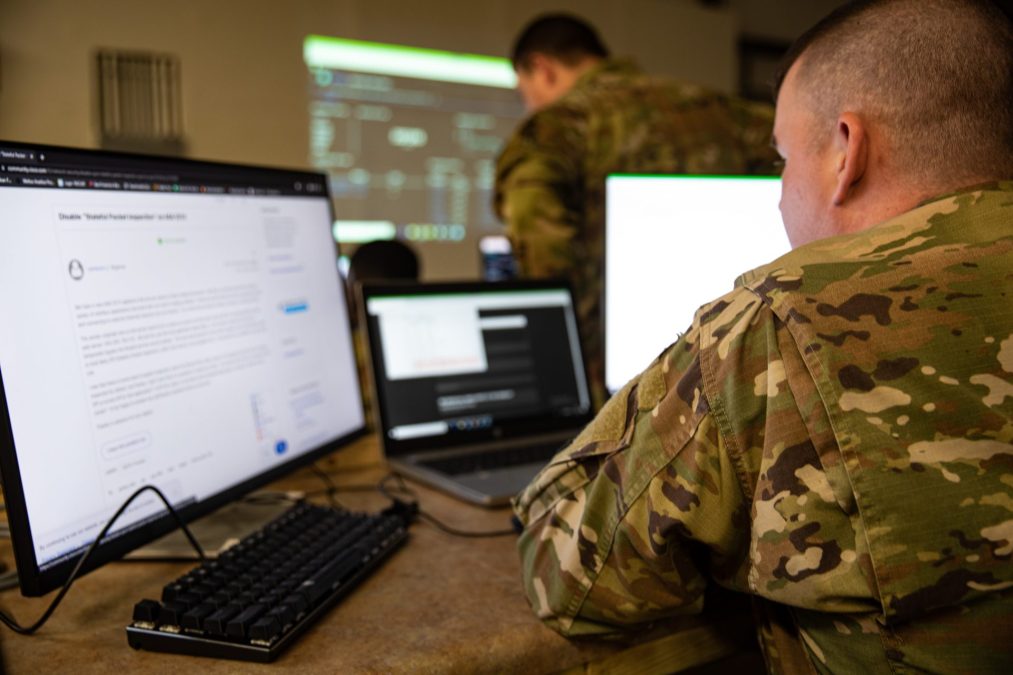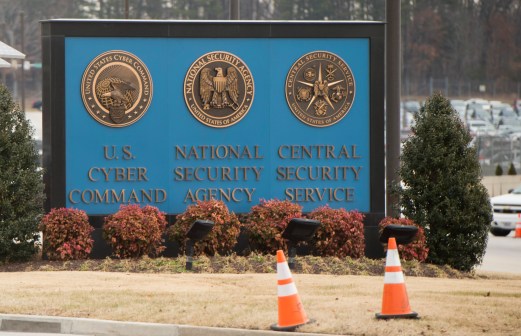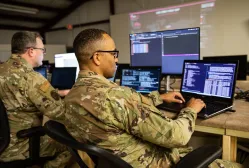Information operations will be ‘foundational’ to future DOD efforts, Cybercom chief says

NASHVILLE, Tenn. — Information operations and activities in the information environment will be “foundational” and important for most everything the Department of Defense will be doing in the future, according to the commander of U.S. Cyber Command.
“I think that largely, information operations are foundational for every operation that the department will do going forward. We have to be thinking about the information environment component of those activities,” Gen. Timothy Haugh, who also leads the National Security Agency, said at the Summit on Modern Conflict and Emerging Threats, hosted by Vanderbilt University, on Wednesday.
In recent years, adversaries have sought to exploit the information environment through disinformation, misinformation, information ops and other activities as a means of undermining U.S. and allied interests without having to confront them in direct military conflict.
The Pentagon has sought to play catch-up of sorts, releasing updates to doctrine and strategy — and the services themselves issuing their own guidance within the information realm.
The DOD has also shifted its mindset in recent years to a stance of perpetual competition. Adversaries have viewed conflict on a continuum while the U.S. has traditionally viewed it as a binary state of either war or peace. The Joint Concept for Competing, released last year, formally recognizes that the department is engaged in a competition on a daily basis below the threshold of all-out conflict.
Additionally, given that much of this information capability will be delivered via cyber means, Cybercom will play a big role in the information environment going forward.
Haugh said the Russia-Ukraine conflict provides some real-world evidence of the importance of the information environment and how certain operations, such as strategic disclosures, can help thwart adversarial efforts.
“The fact that the United States really used sensitive intelligence to be able to demonstrate to the world what we believed Russia was going to do [and] when they were going to do it, too, really set the tone of this is what it means to be for the international dialogue. That was in and of itself a strategic use of information to be able to drive support,” he said regarding the strategic disclosures of intelligence ahead of Russia’s invasion.
Haugh noted that defense officials need to be mindful of how information capabilities will be used against U.S. forces.
“The other aspects, I think, from a military perspective that we need to be thinking about [is] how are we preparing our force for their likely involvement in a conflict and what will the information operations look like targeting our military force?” he said. “How well are we prepared for that? Is that an area that commanders talk about and they’re going to receive messages that are personalized on their own devices? Those are things we need to be thinking about how we prepare.”
During its 2014 incursion into Ukraine, Russia demonstrated the adept ability to target Ukrainian soldiers’ personal devices with tailored messages, something U.S forces took great interest in.
Information operations can also be conducted in the civilian or corporate worlds — something the U.S. government also must be mindful of.
“It’s not just within a military environment. I think we have seen some shifts in the cybercrime world that have already moved to information operations … Not just ransomware holding things at risk, but hacking and extracting information that is now held as a coercive tool for a ransom that is really about the disclosure of information,” Haugh explained. “It’s not just something that is within a military domain or between nations. This can be very personal for any business in the Western society that’s targeted by an actor and coerced based off of a hacking activity that will disclose information, [that] will either to be embarrassing or do some form of competitive advantage. It’s a part of our daily lives and it’s certainly going to be a part of military activities moving forward.”
When it comes to deterring China and being prepared for what Beijing could do, Haugh explained the U.S. must me mindful of how its potential adversary would use information capabilities.
“The area that I think that we have to really be mindful of, is thinking about what the information environment would look like in a crisis with China and how they would use the tools that are available to them in the information environment and what would be the implications of that, both within the region and with our population,” he said.
China’s use of misinformation and disinformation in the Pacific region and across the world to influence various populations, has concerned many.
“The execution of propaganda, misinformation and disinformation is a real concern for me. It should be a real concern for all of the United States. The [People’s Republic of China’s] ability to influence our information environment is concerning,” Adm. John Aquilino, commander of U.S. Indo-Pacific Command, said in March before the Senate Armed Services Committee.
One recent example he provided the committee was the notion being put forth that the West — and particularly, the U.S. — is in decline, while China is rising.
“That is Chinese propaganda. Our economy continues to grow, theirs is in the cellar. So, the actions in the information space, ultimately, it was being reported all over the United States. That’s the expansive ability of mis- and disinformation to influence the United States,” he said. “We ought to understand that it’s occurring and we ought to understand that our free and open media and the truth that we project is a critical value of the United States, it’s one to be protected. But we have to call out the mis- and disinformation to stop that ability to influence.”
Aquilino noted that the best way to combat behavior like this is to “expose the bad and amplify the good.”
“We have to understand how media is used in the People’s Republic of China, oh, by the way, and in Russia, because it’s a similar problem … But it is not what we see in our media. We have to understand what’s occurring in the differences, we have to value it and then we have to expose it,” he said.
The U.S. government has taken the approach of exposing adversary activities — be it by releasing malware samples they use, declassifying videos of their actions, or other methods — as a key way to beat back their malevolent efforts by shaming these actors and revealing their tactics so organizations can develop countermeasures, in addition to declassifying intelligence.
Aquilino’s successor told Congress as part of his confirmation process, that he plans to use information tools and work with other government agencies to maximize information capabilities to beat back and expose malign Chinese behavior.
“We must also employ information-related capabilities to transparently bring attention to malign behavior, such as the United States and our partners publicly releasing video of coercive and risky [People’s Liberation Army] intercepts of our lawfully operating ships and aircraft. If confirmed, I will assess current information-related capabilities and consider all viable options to improve our information operations posture and readiness,” Adm. Samuel Paparo wrote in responses to senators‘ questions. “It is critical that we continue highlighting malign PRC activities in the information environment.”
Paparo also indicated he may be inclined to use the strategic disclosure playbook that officials believed were successful against Russia, in the region against Chinese behavior.
“[W]e learned how the timely sharing of previously classified intelligence with our partners and the public revealed Russia’s imminent plans for an attack and helped spur the international community to act in support of Ukraine. Timely transparency can be an effective tool to counter aggression,” Paparo said. A similar tactic could be used to expose China’s activity towards Taiwan, he added, suggesting he could provide more details to lawmakers in a classified setting.






